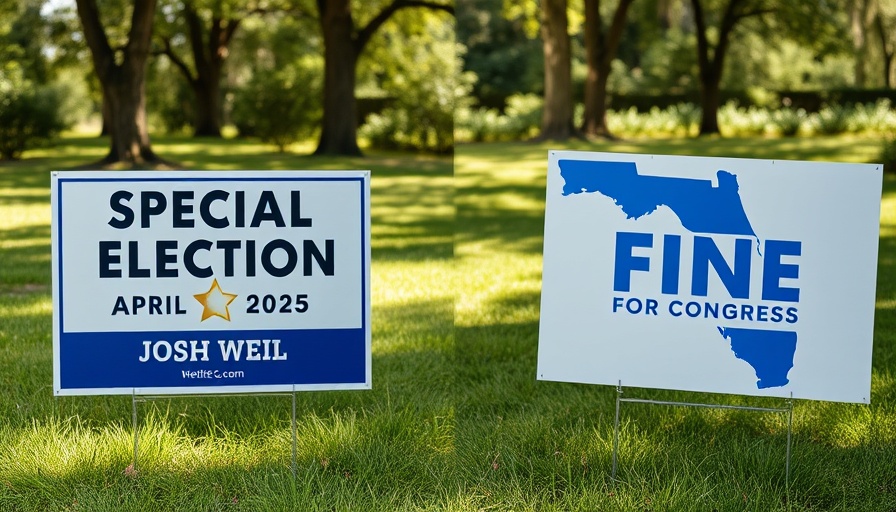
Republicans Strengthen Their Hold: Recent Special Elections in Florida
In a significant political development, Republicans marked two decisive victories in Florida's recent special elections, further solidifying their grip on the House of Representatives. The wins not only enhance the party's majority but also provide a crucial boost to advancing their legislative agenda under President Trump's leadership. Understanding the implications of these results opens a window into the evolving political landscape in the U.S.
A Closer Look at the Winners
In the 6th District, Republican state senator Randy Fine triumphed over Democrat Josh Weil, a public school teacher who notably raised more funds than Fine yet could not secure enough votes. Fine’s victory comes as the seat was previously occupied by Mike Waltz, who vacated it to serve as Trump’s national security adviser. The stakes were high given that Waltz had previously won the seat by a massive margin of over 30 points in 2020, a reflection of the district's Republican leaning.
Meanwhile, in the 1st District, Jimmy Patronis, the state's chief financial officer, defeated gun control activist Gay Valimont. This district had been perceived as less competitive, and Patronis’s solid background in state finance may have contributed to his success. These victories push the Republican tally in the House to 220 seats against the Democrats' 213, with two more vacancies still to fill, both previously held by Democrats.
The Political Landscape Pre-Elections
The lead-up to these elections was intriguing, marked by unexpected competitive dynamics. Fine faced a significant monetary disadvantage, raising under $1 million compared to Weil's more than $9 million. The spotlight further sharpened on the race due to concerns over Trump’s broader political strategy, particularly after his decision to withdraw the name of Rep. Elise Stefanik from U.N. ambassador consideration to preserve the slim margins within Congress.
Implications of the Wins
These electoral outcomes are more than mere numbers—they shape the narrative of Republican resilience in congressional politics. The wins provide Republicans a buffer against potential losses that could arise from upcoming legislation debates and the unpredictability of public sentiment. The implications extend to various federal strategies, amplifying the party's confidence as they move forward with policies that align closely with Trump’s vision.
Looking to the Future: Trends in Political Engagement
As these victories unfold, they signal a broader trend of engagement from Republican voters, particularly within districts traditionally held by the party. Awareness and voter mobilization strategies may be critical going forward, especially as primary challenges and mid-term elections loom on the horizon. With Democrats still grappling with internal divisions, Republican leadership will likely capitalize on these wins to strengthen their positioning through strategic initiatives and outreach.
Voter Perspectives and Reactions
The local and national response to these elections varies widely, underscoring the polarized atmosphere in political discourse. Voter turnout was relatively high, reflecting a growing engagement aligned with core Republican values, particularly surrounding issues like gun rights and educational policy. However, Democrats may seek to regroup and re-strategize, especially by addressing issues resonating with younger voters like gun control, education reforms and health care initiatives.
Conclusion: What These Wins Mean for Florida
The Republican wins in Florida's special elections reveal significant insights into the party's current trajectory and voter priorities. Moving forward, the emphasis on effective governance and responsive policymaking will likely be the key themes as both parties prepare for the consequential challenges ahead. As political analysts sift through data and election results, citizens should remain vigilant and engaged, understanding that their participation shapes the future of our democracy.
 Add Element
Add Element  Add Row
Add Row 



Write A Comment